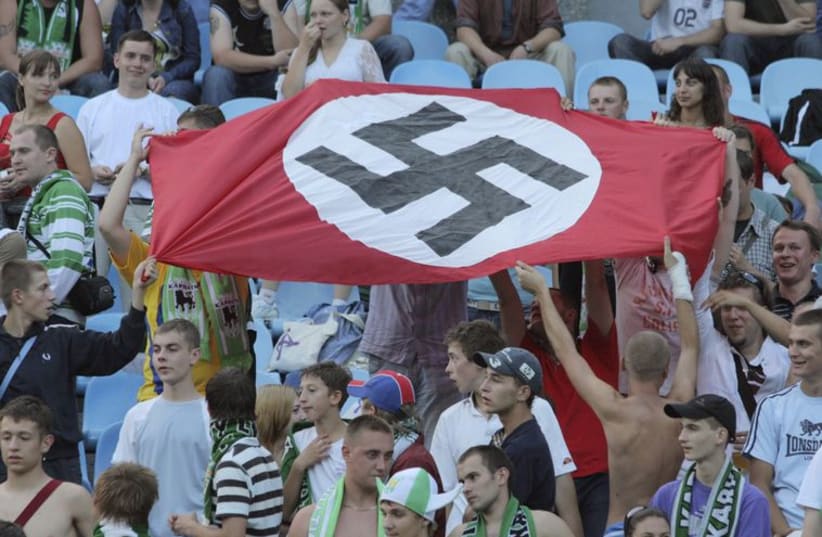See the latest opinion pieces on our page
True, there is no state anti-Semitism in Russia. A wealthy Russian Jew I recently spoke to in Tel Aviv, who still has many business interests in Russia, pooh-poohed my concerns: President Vladimir Putin is not anti-Semitic, he’s surrounded by Jewish advisers and loyalists and has lots of Jewish friends. The Russian president was instrumental in building the Jewish Museum and Tolerance Center in Moscow and he spoke there on the Holocaust Remembrance Day. Jews have never had it so good in Russia since they first appeared in Muscovy in the 15th century. Many Russian Jews the businessman knows are grateful to Putin for his tolerant policies.Nevertheless, Russia has embarked on a dangerous course – dangerous for Russia itself as well as for its remaining Jewish population. Over the past year, ever since Russia annexed Crimea and sponsored a separatist rebellion in eastern Ukraine, Putin has been working to isolate Russia from the international community. The anti-American rhetoric, which has been a staple of the government-owned Russian media for some time, has now turned into virulent xenophobia: the official propaganda is increasingly portraying Russia as a country at war, besieged by enemies and fighting a lonely battle for survival.There are currently two dominant ideological strains in the official propaganda. One is Russian nationalism, harking back to the Russian empire and the Black Hundred, a xenophobic Russian Orthodox movement; the other is nostalgia for the Soviet past.Both are anti-Semitic, the former openly and unabashedly so, and the latter camouflaging primitive Jew-hatred as opposition to Zionism and support for the “brotherly” Arab nations.Joseph Stalin turned openly anti-Semitic by the end of his life, disguising his hatred by attacking “rootless cosmopolites,” his code word for the Jews. He executed members of the wartime Jewish Anti-Fascist Committee, including five Yiddish poets, and staged a show trial of a number of prominent Jewish medical doctors, labeling them “murderers in white coats.” Only his timely death saved Soviet Jewry from a nationwide pogrom, preparations for which were already underway. Yet, in the current environment, amid widespread nostalgia for the powerful Soviet Union, Stalin has emerged as a national hero – specially among the younger generation.But it is an even more fundamental problem. Throughout history Jews have been a ready target for all repressive, xenophobic and failing regimes. We have been a kind of litmus test: whenever a country hits a terminal decline, its government declares that Jews are to blame for all its woes, either the local Jewish population or “international Jewish bankers” or both.When protests swept Poland in 1980, at the tail end of communist rule, a Western journalist was taking a cab in Warsaw.Talking about the Solidarity trade union, the cabbie declared confidently that it was “the kikes” who were causing all the trouble.When the journalist pointed out that there were only a few thousand Jews still left in all of Poland, not enough to stir up anything, the cabbie looked at him as though he were stupid or naive.Russia is now going through a disastrous economic crisis. It has been triggered by Western sanctions in response to its annexation of Crimea and exacerbated by a drop in world oil prices. But underneath it all, the Russian economy has been severely crippled by Putin’s kleptocratic, irresponsible regime. A decade and a half of record-breaking oil prices gave Russia a nearly $3 trillion windfall. Most of that money was either stolen by Putin’s cronies or squandered on white elephant projects, leaving the economy in shambles. There is no question that sooner or later the government will tell its people that the real culprits were the Jews. This has been done since time immemorial, and Russia is not going to be an exception.As to the Jews’ loyalty to the Putin regime, it is simply irrelevant.Let’s think back of German and Austrian Jews once again.Many of them fought for their country in World War I. Even now, Jewish stars can be seen among the crosses in German military cemeteries around Verdun.My own grandfather was drafted into the Austrian-Hungarian army and sent to the Russian front. Given the Nazis’ obsession with World War I, many of them thought that their honorable service would spare them. They could not have been more tragically mistaken.Russian Jews are starting to understand what’s at stake. The waiting period for an immigrant visa at the Israeli consulate in Moscow has lengthened to nine months. This past New Year’s, I saw several of my Moscow friends in Israel, receiving Israeli passports – just in case – but then returning to Russia where they have businesses and jobs.My advice to them: they should think hard about shifting their assets to Israel, establishing their businesses here and, most importantly, take residency.Otherwise they may one day soon discover that they’re too late.The author is a Russian-born economist and writer based in New York. He’s a member of the Advisory Board of the Sakharov Foundation. His new detective novel, Murders Behind Closed Doors, set in Moscow in the 1960s, will be published in May.
Russian Jews should heed lessons of history
The fear that many Jews still living in Russia face anti-Semitism should raise concerns amongst those who remain.
